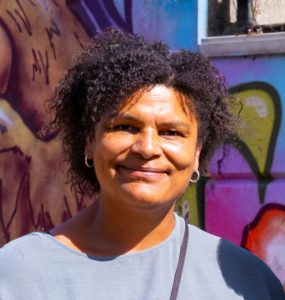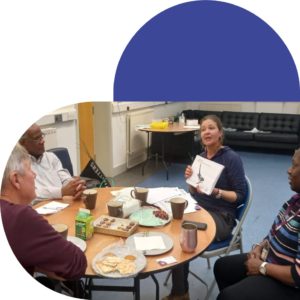

Our priority outcome: Improved support in the community for residents to live healthier and happier lives
We believe communities know best what they need to thrive and be healthy. And that they should be involved in shaping how health and care support is provided. We recognise that there are barriers that stand in the way of some of our most vulnerable communities getting the support they need, and we are prioritising ways of addressing this.
We are pioneering a joint approach in Lambeth with social prescribing link workers, the voluntary, community and social enterprise sector (VCSE) and statutory organisations. We aim to create and support a network of ‘Thriving Community’ groups across Lambeth Primary Care Networks (PCNs), taking our lead from grassroots organisations.

Context and key challenges
Communities have different health and care needs. Lambeth’s population is diverse: 43% are Black, Asian, or Multi-Ethnic. Black or Black British Africans make up 12% of the population, while Black or Black British Caribbeans make up 10%. And the proportion of people living with two or more long term health conditions is significantly higher in Black communities (29%) than in Asian (19%) and White (17%) communities.
As an Alliance, we need to be mindful about how we can meet the diverse needs of our communities in a way that builds trust.
What we offer
Community development framework: Thriving Communities
Our Thriving Communities project supports Lambeth’s extensive voluntary, community and social enterprise sector (VCSE) to establish relationships with health care providers to address local health needs in ways that fit and are built from local insights, experience and circumstances. Our approach recognises that, for example, the needs of residents in Streatham will be different to those of Stockwell.
Working collaboratively with Lambeth’s public health team these local networks have helped tailor health improvement initiatives such as local food schemes to ensure that local communities can adopt healthy lifestyles and prevent ill health.
Working directly with some of our most vulnerable residents, social prescribing link workers in GP practices are key to understanding need. Social prescribing link workers connect people with local community activities and services that help improve their health and wellbeing, and they work at neighbourhood level in ‘primary care networks’ in Lambeth. We work with them to run community health and wellbeing events with grassroots organisations that provide a connection between residents and health and care services, and build trust.
Test and Learn pilot schemes
We collaborate with health research teams and community organisations to trial proactive outreach activities as ‘Test and Learn’ pilot schemes. These projects focus on specific health inequalities and gather data on the impact of offering access to health and wider social support services.
- Loneliness Project – proactively engaging with patients identified as socially isolated. Patients were contacted by the social prescriber who connected them to local support services and projects where there was a need
- Mental Health Project – building on learning from the loneliness project and in response to post-covid hesitancy to re-engage with community activities; in this project, we co-designed and funded four new mental health-focused community projects with local groups
- Tea and Harmony – bi-weekly singing for wellbeing project
- The Rose Café – weekly group for the over 65s and their carers to enjoy refreshments connection and activities. Facilitated by Home Instead
- Furaha Project by Holistic Well Woman – engaging and supporting local people through crafting and wellbeing activities
- Three public health and wellbeing days coordinated by Carers4Carers Lambeth
- Dominoes Project – working with Black Thrive, Brixton Immortals Dominoes Club and an NHS England research team to offer health interventions and wider social support advice, with a focus on Black communities. A clinical practitioner and a social prescriber were present at each round of a dominoes tournament to engage with players and spectators, offering blood pressure checks, medical advice and signposting to community services.
Our impact
As a result of our efforts so far we have:
- increased knowledge about what support is available to residents, leading to more referrals and signposts to health, care and voluntary sector services
- grown a network of local stakeholders who regularly engage and are keen to continue to collaborate in future projects
- supported increased capacity of social prescribers within primary care networks by demonstrating impact and increased confidence in trialling new ways of working with groups; we have enabled primary care health interventions to be offered in community settings and created new activities that address the health inequalities and social support needs of local communities
- established a growing interest amongst local healthcare staff across a variety of roles in working with patients in different contexts
Our next steps
We will continue to support the expansion and reach of these networks Lambeth-wide to support projects and programmes that strengthen and deepen relationships between residents, grass-roots organisations, the local health and care services. We work in partnership with the Lambeth Public Health team to develop community health and wellbeing initiatives, grassroot projects and cost of living support that are delivered by local organisations to reduce health and social inequalities. Here is just a few examples of some future activities:
- Over the next 18 months, with BigKid Foundation (at Dexters Adventure Playground) we will establish a health and wellbeing hub, where people of all ages can access activities to improve their health and wellbeing. The focus will be on building intergenerational relationships and connecting service users with their local community to help reduce loneliness and isolation
- Co-creating a future programme of work with the Brixton Immortals dominoes club to provide health interventions and social prescribing activities to the Anglo-Caribbean Domino League membership. This will address the community’s specific health needs through engagement, education, and support
- Female patients make up the majority of the referrals link workers receive. We’ve identified some clear trends in their social support needs, as well as health and wellbeing concerns and we’ve looked at data about which community partner organisations they are being signposted to. So, following a successful application to the Healthy London Partnership Social Prescribing Innovators Programme, we will run a pilot project from October 2022 – March 2023, focusing on the health needs of women between the ages of 25 and 70. Sessions will be open to women registered at three GP practices. Clinical staff will offer routine health checks and sessions will also include facilitated discussions on women’s health and signposting to local sources of support or participation opportunities. Lessons from this pilot will inform future localised approaches to supporting women’s health across wider areas

Case study 1: Thriving Thriving Hills, Brook & Dales – trust in community co-creation
Thriving Hills, Brook & Dales (HBD) Primary Care Network (PCN) understand the value of learning from and contributing to local collective expertise. In this southern part of Lambeth, the PCN has developed partnerships to maximise the benefit of doing things differently to address health and social inequalities.
It began with monthly community ‘networking breakfasts’ facilitated by Thriving HBD’s social prescribers working from GP practices. This became a forum for community organisations and projects to exchange information about what they do, create relationships, share funding information and explore possible opportunities for collaboration around the population’s most pressing health needs.
In addition to community wellbeing engagement events throughout the last year, the PCN established the HBD Patient Engagement Group. This continues to be a forum for patients, practice managers and clinical and non-clinical employees from the Primary Care Network to discuss the PCN’s priorities, find opportunities to involve patients, share information on new services and projects, generate ideas, and plan community health activities. This group ran a community health event on the Tulse Hill Estate in June 2022 and reviewed all PCN GP practice websites in August 2022.
Case study 2: Healthy Church Initiative
The Healthy Church Initiative (HCI) is a community-based scheme to support pastors and congregation members to look after their health. It is a health promotion programme that the NWDA has initiated through its ‘Thriving Communities’ workstream.
Using faith as the foundational driver, churches are engaged in a 6-week programme to promote healthy living within Black communities. Dieticians and others are delivering culturally appropriate weekly education sessions designed to achieve improved health outcomes such as increased weight loss, and to support healthier behaviours in areas including meal planning and physical activity.
Through a targeted approach, this programme seeks to reduce health inequalities: diabetes, heart disease, high blood pressure and high cholesterol have a high prevalence in Lambeth’s Black communities. Its innovative approach takes health promotion activity into the heart of Lambeth’s Black population.
Case study 3: Lambeth Rose Café – reducing social isolation and tackling loneliness in our community

Being socially isolated can lead to feelings of loneliness, anxiety and depression, which can result in conditions such as high blood pressure and obesity.
The Neighbourhood & Wellbeing Delivery Alliance worked with the Hills, Brook and Dales Primary Care Network on a loneliness project to support residents in Herne Hill and Tulse Hill. With funding from Lambeth Council’s mental health promotion and prevention programme, the project used social prescribing workers in GP practices to link frail older people experiencing isolation to the Rose Café and other local community programmes.
The Rose Café, led by Home Instead, provides community-based care for older adults living in Lambeth. It opened in December 2021 at the Old Library in West Norwood as a partnership project between Home Instead, the local PCN and Thriving Hills, Brook and Dales. The free weekly ‘pop-up’ Café offers much needed support by welcoming people over 65 and those with dementia and their carers for activities and socialising in a relaxed environment.
Activities include knitting sessions and dementia-friendly film screenings, in collaboration with the local cinema. Specialist advisors are invited in to offer talks on topics such as managing on a budget and eating healthily with diabetes. The Lambeth Digital Champions Project also provides online access assistance at the café, offering one-to-one support to use mobile devices, access GP records, and shop online.
Additionally, the team has developed connections with local professionals who assist with delivering monthly evidence-based dementia-friendly activities that are accessible both in person and online. This includes music and art therapy provided by trained musicians. Each activity is designed with people with dementia in mind to support their physical and mental health.
The Café also directs people to activities and assistance in the local area thanks to partnerships with Lambeth Alzheimer’s Society, Dementia Action, and the Norwood Pensioners’ Hub and other groups.
“At the beginning, we had guests who were very nervous and quiet, they didn’t want to do much and didn’t want to socialise. Over time they have developed their confidence and are taking part in many more of the activities on offer.”
Kemi Browne – Community Engagement Officer
“I just wanted to send you a little note to thank you so much for a lovely Jubilee party today. What a lot of work you must have had, but it really was a great success and David [and Pamela much enjoyed it. David even got onto the dance floor – which he hasn’t done for months! A huge, big thank you from David, Pamela and me.”
Norinka, carer and guest at the Rose Cafés Queen’s Silver Jubilee Party summer 2022